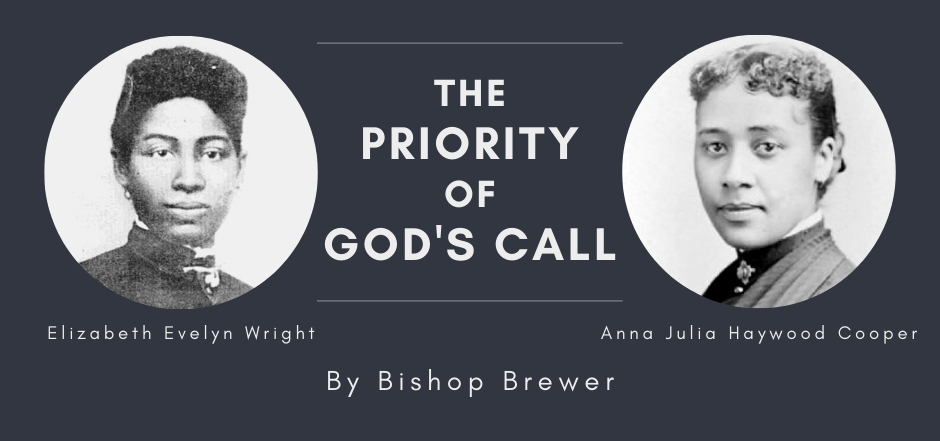The Priority of God’s Call
Feb. 28 marks the day we give special thanks for two extraordinary pioneers.
Anna Julia Haywood Cooper
Anna Julia Haywood Cooper was born in 1859 in Raleigh, North Carolina. She was a teacher; she went to what was at that point the embryonic version of what we know as St. Augustine College and, through an extraordinary set of circumstances, did everything she could to be raised up as a teacher.
Doors were opened to her. She assisted in organizing the Colored Women’s League and the first “colored” settlement in Washington, D.C. She became the fourth Black woman to complete her doctorate at the Sorbonne in Paris.
None of that was ever expected of her.
Elizabeth Evelyn Wright
Elizabeth Evelyn Wright was born in Talbotton, Georgia in 1872.
Wright tried to start a school for rural Black children in Hampton County, South Carolina, but it was burned to the ground. Undaunted, she went to Tuskegee, where Booker T. Washington’s wife, Margaret Murray Washington, saw her promise and opened doors for her that she could never have opened on her own.
After Wright got more education, she went back and started another school. But it met the same fate. So she wound up going to Denmark, South Carolina, where she founded an industrial institute, which later changed the course of the lives of a number of Black people in that community and ultimately became Vorhees College.
Treasures Within
What do we learn from people like that? It seems clear that both these women gave themselves to what God had called them to do. They didn’t hold back. They had a vision for themselves that was, in fact, bigger than what others expected.
It is worth praying, “God, what do you see in me? What have you put in me?” Some of us would shy away from that prayer, because we think if we ask God to really show us what’s going on inside us, we will see a lot of sin.
But the fact of the matter is that God has put treasures in us. That’s a part of what we have received from him. And because he has put treasures in us, there is the opportunity to see ourselves in a new way and, in the light of that, to begin to think about how God might want to use us in the lives of other people, according to the passions and gifts he has given us.
One of the things I love about this celebration is that we’re not just celebrating the life of a monk. These are women who truly gave themselves to their communities. It’s another way of saying that the gifts and call of God are never limited to ordination, and that there is a vocational call that God has put on each one of us.
This, then, is my prayer: God, show me, show me what treasure you have put within me, so that I might use it and be a faithful steward of it for the sake of the kingdom.
Opposition Without
If you pray this prayer, you may face some genuine opposition. Hopefully, nobody’s going to burn your school to the ground, as they did with Wright’s schools, or want to throw you off a cliff, as they tried to do with Jesus. But the fact of the matter is that to step into something that is bigger than you are, and to be a channel that God uses in the lives of other people, gets a little demonic notice.
In fact, stepping into a place of ministry automatically invites that kind of pushback. But it’s meant, in fact, to toughen us up. And to teach us to rely even more deeply upon the gifts God has given us, and not just our capacity to get things done. God, as you may have read in previous posts, delights in putting us in circumstances that are beyond our ability to teach us to rely on him in ways that we would never do if it were only up to our own devices.
So what is the treasure that God has put within you, within me? And how would he have us use it in a way that is for the extension of his kingdom, whether it be in our community or beyond?
Don’t get distracted by daydreams. Instead, fuel your prayer and see what God reveals.
What “treasure within” has God given you? Share this post and your response on Twitter. Please include my username, @revgregbrewer.
(This post is an adaption of Bishop Brewer’s sermon on Feb. 28, 2019, in the Diocesan Chapel in Orlando, Florida).
Unless otherwise noted, Scripture quotations are from the New Revised Standard Version Bible, copyright © 1989 the Division of Christian Education of the National Council of the Churches of Christ in the United States of America. Used by permission. All rights reserved.

